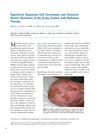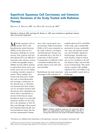Aggressive Squamous Cell Carcinomas of the Scalp
September 2006
in “
Dermatologic Surgery
”
squamous cell carcinoma SCC Mohs surgery alopecia actinic damage wide excision margin control split-thickness grafting postoperative irradiation osteoradionecrosis satellitosis radiation therapy scalp resection grafting sentinel lymph node biopsy nodal dissection skin cancer hair loss sun damage wide surgical removal skin grafting radiation treatment bone damage from radiation spread of cancer lymph node biopsy lymph node removal

TLDR Some aggressive scalp cancers are hard to treat and can be deadly, even when removed with specialized surgery.
The document from 2006 reports on a study of 11 cases of aggressive squamous cell carcinomas (SCCs) of the scalp, which were particularly challenging to treat due to their tendency to recur after Mohs surgery, develop satellite lesions, invade bone, and metastasize. The study found that 5 of the 11 patients died from their disease, and all had significant alopecia or thinning hair with marked actinic damage. Despite clear margins obtained with Mohs micrographic surgery, 4 patients experienced recurrences. The study recommends wide excision with margin control, split-thickness grafting, and postoperative irradiation for cases with satellitosis, but notes the risk of osteoradionecrosis. It emphasizes that tumor aggressiveness should not be underestimated based on the degree of differentiation, as even well-differentiated tumors in this series were aggressive. The document also discusses the risks of radiation therapy, including short-term and long-term effects, and suggests that for patients with extensive actinic damage and multiple SCCs, a wide scalp resection with grafting and postoperative irradiation, along with sentinel lymph node biopsy and nodal dissection if necessary, may be the best treatment approach, although it was not successful in the cases studied, possibly due to late intervention.




